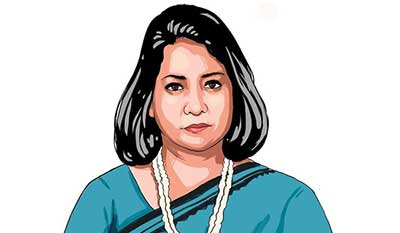Originally posted in The Business Standard on 6 July 2024
Formulating policies based on incorrect data raises questions about GDP growth figures, she says
The primary goal of a budget should be to curb inflation and provide relief to the public by boosting the food supply. However, the 2024-25 fiscal year budget lacks such measures, according to Fahmida Khatun, executive director of the Centre for Policy Dialogue (CPD).
In a budget review webinar organised by the Forum for Bangladesh Studies on Saturday (6 July), she said, “We observe a significant reduction in open market sales (OMS) of essential commodities to low-income groups. Furthermore, the overall food programme is inadequate compared to demand.”
“Our budget is being implemented within the political and economic framework, but without political accountability, we cannot expect positive outcomes — this remains our primary challenge,” she said.
Fahmida Khatun said no matter how sound economic policies may be, they lose significance if the welfare of ordinary people is not prioritised. Weakness in economic institutions often stems from a lack of accountability.
“The budget is not just a balance sheet of income and expenditure; it should also reflect fairness. It has the potential to address income disparities and societal inequalities,” she continued.
“Vehicle import tax for MPs was proposed in the budget but it was eventually scrapped even though many parliamentarians are financially affluent themselves,” she said.
“Significant discrepancies have been uncovered in our export data, revealing a concerning disregard for information by the government. Formulating policies based on incorrect information is erroneous and raises questions regarding the accuracy of GDP growth figures,” Fahmida Khatun added.
Rashed Al Mahmud Titumir, a professor in the Department of Development Studies at the University of Dhaka, said, “Journalists should ask the planning and finance ministers about the timeline for publishing revised data on gross domestic product (GDP), correcting the error in the data regarding nearly $14 billion export.”
Jyoti Rahman, director of International Affairs at the Sydney Policy Analysis Centre, delivered the keynote speech during the webinar.
He said, “There are significant concerns among people regarding the information provided by the Bangladesh government which is natural considering the recent revelation of the $14 billion export data anomaly.
“The lingering question, he said, is one of how much trust we should place in government data and how much credence we should give to its accuracy.”
The analyst continued, “When the Awami League government took office, the budget deficit was 2.5% of GDP, with primary expenditure below 1% of GDP. From the fiscal years 2016-17 to 2021-22, we observed the budget deficit remaining below 3% and the primary deficit staying under 1.5%.”
“The deficit began to rise from 2017 onwards, reaching 4.5% of GDP before the Covid-19 pandemic. The reasons for this increase prior to the pandemic included development expenditure, subsidies, grants, and transfers,” said Jyoti.
“However, in the post-Covid budgets, our deficit has increased further due to the increase in non-development expenditure,” he added.
Jyoti Rahman said about 20% of the government’s revenue collection goes to interest payments on domestic and foreign loans, 40% to subsidies, grants and transfers, 20% to salaries of government officials and employees, and 20% to other non-development expenditures.
“If we examine the budget data, it becomes evident that between FY21 and FY24, our GDP has grown by 1%. Half of this growth, amounting to Tk429 billion, is attributed to subsidies. Specifically, there was a Tk261 billion increase in subsidies to the Bangladesh Power Development Board (PDB) during that timeframe,” he said.
“A 0.3% of GDP increase in incentives has amounted to Tk220 billion between FY21 and FY24, with Tk173 billion allocated to agriculture. The rise in subsidies will be a major factor contributing to the budget deficit in the coming days,” Jyoti Rahman added.



